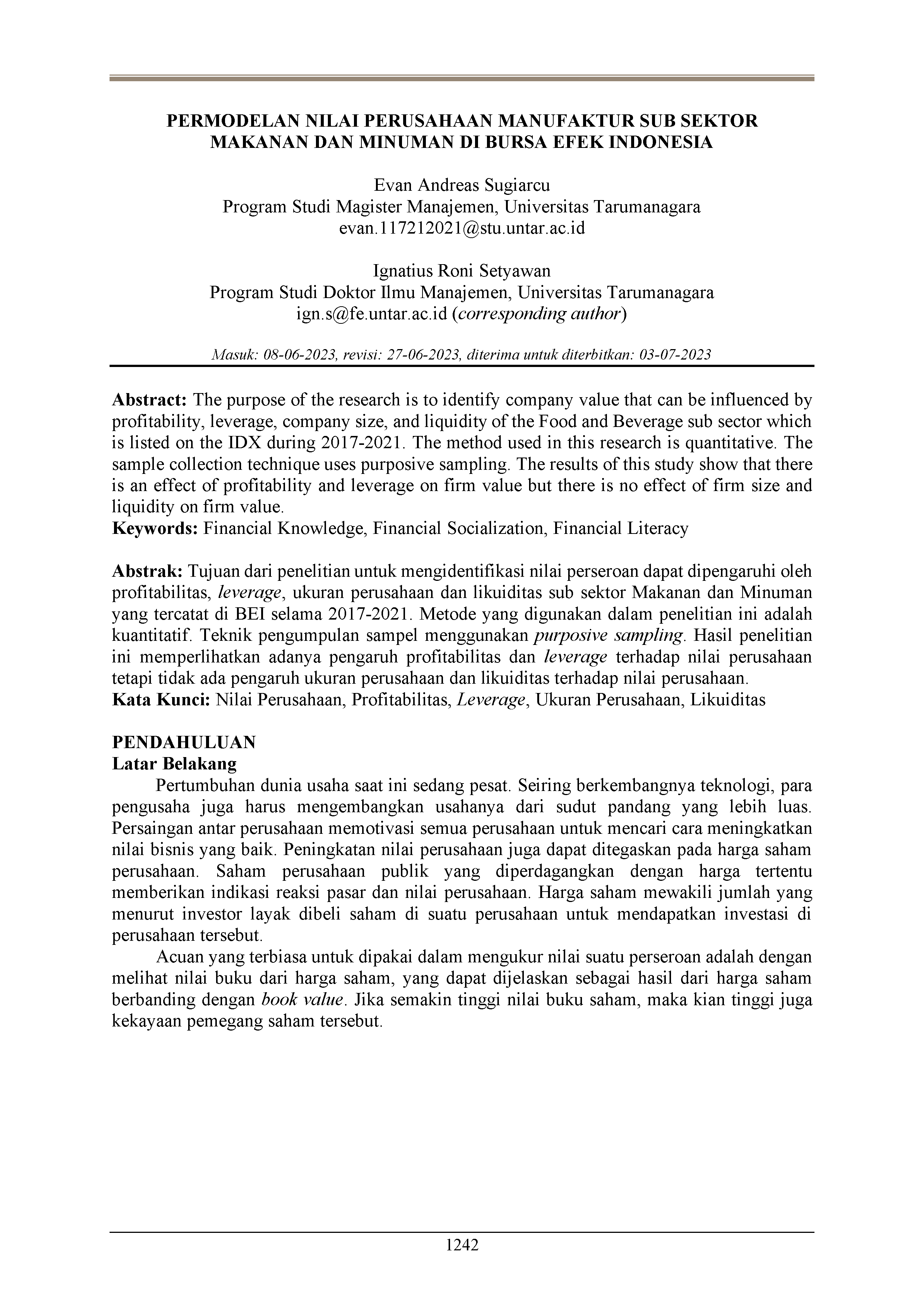Permodelan nilai perusahaan manufaktur sub sektor makanan dan minuman di Bursa Efek Indonesia
Main Article Content
Abstract
The purpose of the research is to identify company value that can be influenced by profitability, leverage, company size, and liquidity of the Food and Beverage sub sector which is listed on the IDX during 2017-2021. The method used in this research is quantitative. The sample collection technique uses purposive sampling. The results of this study show that there is an effect of profitability and leverage on firm value but there is no effect of firm size and liquidity on firm value.
Tujuan dari penelitian untuk mengidentifikasi nilai perseroan dapat dipengaruhi oleh profitabilitas, leverage, ukuran perusahaan dan likuiditas sub sektor Makanan dan Minuman yang tercatat di BEI selama 2017-2021. Metode yang digunakan dalam penelitian ini adalah kuantitatif. Teknik pengumpulan sampel menggunakan purposive sampling. Hasil penelitian ini memperlihatkan adanya pengaruh profitabilitas dan leverage terhadap nilai perusahaan tetapi tidak ada pengaruh ukuran perusahaan dan likuiditas terhadap nilai perusahaan.
Article Details
Section

This work is licensed under a Creative Commons Attribution-NonCommercial-ShareAlike 4.0 International License.
This work is licensed under a Jurnal Manajemen Bisnis dan Kewirausahaan Creative Commons Attribution-ShareAlike 4.0 International License.
How to Cite
References
Brigham, E. F., & Ehrhardt, M. C. (2011). Financial management: Theory and practice (13th ed.). Cengage Learning.
Brigham, E. F., & Gapenski, L. C. (1996). Intermediate financial management (5th ed.). The Dryden Press.
Brigham, E. F., & Houston, J. F. (2015). Fundamentals of financial management (14th ed.). Cengage Learning.
Darminto, D. P. (2019). Analisis laporan keuangan: Konsep dan aplikasi (4th ed.). UPP STIM YKPN.
Ghozali, I. (2018). Aplikasi analisis multivariate dengan program IBM SPSS 25 (9th ed.). Badan Penerbit Universitas Diponegoro.
Gitman, L. J., & Zutter, C. J. (2015). Principles of managerial finance (14th ed.). Pearson Education.
Harmono. (2009). Manajemen keuangan: Berbasis balanced scorecard pendekatan teori, kasus dan riset bisnis. Bumi Aksara.
Hasibuan, H. M. S. P. (2016). Manajemen sumber daya manusia. Bumi Aksara.
Iswajuni, Manasikana, A., & Soetedjo, S. (2018). The effect of enterprise risk management (ERM) on firm value in manufacturing companies listed on Indonesian Stock Exchange year 2010-2013. Asian Journal of Accounting Research, 3(2), 224–235. https://doi.org/10.1108/AJAR-06-2018-0006
Jihadi, M., Vilantika, E., Hashemi, S. M., Arifin, Z., Bachtiar, Y., & Sholichah, F. (2021). The effect of liquidity, leverage, and profitability on firm value: Empirical evidence from Indonesia. Journal of Asian Finance, Economics and Business, 8(3), 423–431. https://doi.org/10.13106/jafeb.2021.vol8.no3.0423
Kaaro, H. (2003). Simultaneous analysis of corporate investment, dividend, and finance: Empirical evidence under high uncertainty. Journal of Accounting, Management, and Economics Research (JAMER), 3(1), 1–17. https://papers.ssrn.com/sol3/papers.cfm?abstract_id=2049481
Kasmir. (2017). Analisis laporan keuangan. Rajagrafindo Persada.
Lestari, K. A., Titisari, K. H., & Suhendro. (2021). Analisis nilai perusahaan ditinjau dari profitabilitas, likuiditas, struktur modal, kebijakan dividen dan kepemilikan manajerial. Jurnal Manajemen, 17(2), 248–255. https://doi.org/10.30872/jinv.v17i2.9211
Mardiyati, U., Abrar, M., & Ahmad, G. N. (2015). Pengaruh keputusan investasi, keputusan pendanaan, ukuran perusahaan dan profitabilitas terhadap nilai perusahaan pada sektor manufaktur barang konsumsi yang terdaftar di Bursa Efek Indonesia periode 2010-2013. JRMSI - Jurnal Riset Manajemen Sains Indonesia, 6(1), 417–439. https://doi.org/10.21009/JRMSI.006.1.05
Myers, D. G. (2010). Social psychology (10th ed.). McGraw-Hill.
Nohong, M. (2016). Inovasi, pertumbuhan, ukuran dan nilai perusahaan farmasi di Indonesia. Jurnal Keuangan dan Perbankan, 20(2), 176–185. https://doi.org/10.26905/jkdp.v20i2.250
Putra, T. P., Chabachib, M., Haryanto, M., & Pangestuti, I. R. D. (2012). Pengaruh kinerja keuangan dan beta saham terhadap price to book value (Studi pada perusahaan real estate dan property yang listed di Bursa Efek Indonesia periode tahun 2004-2006). Jurnal Studi Manajemen Organisasi, 4(2), 81–90. https://doi.org/10.14710/jsmo.v4i2.4252
Riyanto, B. (2001). Dasar-dasar pembelanjaan perusahaan (4th ed.). BPFE.
Sartono, A. (2010). Manajemen keuangan: Teori dan aplikasi (4th ed.). BPFE.
Sawir, A. (2009). Analisis kinerja keuangan dan perencanaan keuangan perusahaan. Gramedia Pustaka Utama.
Spence, M. (2002). Signaling in retrospect and the informational structure of markets. American Economic Review, 92(3), 434–459. https://doi.org/10.1257/00028280260136200
Sugiono, L. P., & Christiawan, Y. J. (2013). Analisa faktor yang mempengaruhi likuiditas pada industri ritel yang terdaftar pada Bursa Efek Indonesia tahun 2007-2012. Business and Accounting Review, 1(2), 298–305. https://publication.petra.ac.id/index.php/akuntansi-bisnis/article/view/1050
Sulastri, N. L., Salim, M. A., & Priyono, A. A. (2020). Pengaruh likuiditas, solvabilitas, profitabilitas terhadap nilai perusahaan sektor makanan dan minuman di Bursa Efek Indonesia periode 2017-2020. e-Jurnal Riset Manajemen, 11(15), 22–32. http://jim.unisma.ac.id/index.php/jrm/article/view/15670%0Ahttp://jim.unisma.ac.id/index.php/jrm/article/download/15670/11881
Willyanto, V. F., & Setyawan, I. R. (2022). Pengaruh liquidity, profitability, dan dividend policy terhadap firm value. Jurnal Manajerial dan Kewirausahaan, 4(3), 597–606. https://doi.org/10.24912/jmk.v4i3.19675
Zuhroh, I. (2019). The effects of liquidity, firm size, and profitability on the firm value with mediating leverage. The 2nd International Conference on Islamic Economics, Business, and Philanthropy (ICIEBP), 203–230. https://doi.org/10.18502/kss.v3i13.4206


